Cristiano Ronaldo
From Wikipedia, the free encyclopedia
This article is about the Portuguese footballer. For the Brazilian footballer, see Ronaldo. For other people named Ronaldo, see Ronaldo (name).
"CR7" redirects here. For other uses, see CR7 (disambiguation).
This name uses Portuguese naming customs. The first or maternal family name is dos Santos and the second or paternal family name is Aveiro.
 Ronaldo playing for Portugal. |
|||
| Personal information | |||
|---|---|---|---|
| Full name | Cristiano Ronaldo dos Santos Aveiro | ||
| Date of birth | 5 February 1985 | ||
| Place of birth | Funchal, Madeira, Portugal | ||
| Height | 1.86 m (6 ft 1 in)[1] | ||
| Playing position | Forward | ||
| Club information | |||
| Current club | Real Madrid | ||
| Number | 7 | ||
| Youth career | |||
| 1993–1995 | Andorinha | ||
| 1995–1997 | Nacional | ||
| 1997–2002 | Sporting CP | ||
| Senior career* | |||
| Years | Team | Apps† | (Gls)† |
| 2002–2003 | Sporting CP | 25 | (3) |
| 2003–2009 | Manchester United | 196 | (84) |
| 2009– | Real Madrid | 112 | (124) |
| National team‡ | |||
| 2001–2002 | Portugal U17 | 9 | (6) |
| 2002–2003 | Portugal U20 | 5 | (3) |
| 2003 | Portugal U21 | 6 | (1) |
| 2004 | Portugal U23 | 3 | (1) |
| 2003– | Portugal | 100 | (37) |
| * Senior club appearances and goals counted for the domestic league only and correct as of 20:53, 11 November 2012 (UTC). † Appearances (Goals). ‡ National team caps and goals correct as of 20:20, 16 October 2012 (UTC) |
|||
Ronaldo began his career as a youth player for Andorinha, where he played for two years, before moving to C.D. Nacional. In 1997, he made a move to Portuguese giants Sporting Clube de Portugal. Ronaldo caught the attention of Manchester United manager Alex Ferguson, who signed him for £12.24 million (€15 million) in 2003. The following season, Ronaldo won his first club honour, the FA Cup.
Ronaldo was the first player to win all four main PFA and FWA awards, doing so in 2007. In 2008, Ronaldo won the Ballon d'Or.[6] He placed second in the Ballon d'Or in 2007, 2009, and 2011. He was awarded the European Golden Shoe in both 2008 and 2011. In 2008, he won three of the four main PFA and FWA trophies and was named the FIFPro Player of the Year, World Soccer Player of the Year, Onze d'Or, and the FIFA World Player of the Year.[7][8][9] In 2007 and 2008, Ronaldo was named FWA Footballer of the Year. Ronaldo was the inaugural winner of the FIFA Puskás Award in 2009.
Ronaldo holds numerous former and current scoring records, including records for most goals scored in a season for Real Madrid, most goals scored per minute in La Liga, first top European league player to reach 40 goals in a single season in two consecutive years, fastest Real Madrid player to reach one hundred league goals, and the first player ever to score against every team in a single season in La Liga.[10]
Ronaldo is a Portuguese international and made his debut against Kazakhstan in August 2003. He has since participated in five major tournaments; UEFA Euro 2004, the 2006 FIFA World Cup, UEFA Euro 2008, the 2010 FIFA World Cup and UEFA Euro 2012. He scored his first international goal in the opening game of the Euro 2004 against Greece, in addition to helping Portugal reach the final. He took over the captaincy of the side in July 2008 and went on to captain Portugal to the semi-finals at the Euro 2012 and finished the competition as the joint best scorer with three goals. On 16 October 2012, Ronaldo won his 100th cap against Northern Ireland, making him the third highest capped player for Portugal and became the third youngest European to reach a century of international appearances.[11] In October 2012, he became the first sportsperson to reach 50 million followers on Facebook.[12]
Contents |
Early life
Ronaldo was born in Santo António, a neighbourhood of Funchal, Madeira, the youngest child of Maria Dolores dos Santos Aveiro, a cook, and José Dinis Aveiro, a municipal gardener.[13] His second given name "Ronaldo" was chosen after then-U.S. president Ronald Reagan, who was his father's favourite actor. He has one older brother, Hugo, and two older sisters, Elma and Liliana Cátia.[3] His great-grandmother Isabel da Piedade was from Cape Verde.[14] On 16 October 2012, Ronaldo became first ever athlete to get 50 million Likes on Facebook.[15]Club career
Early career
At the age of eight, Ronaldo played for amateur team Andorinha, where his father was the kit man. In 1995, Ronaldo signed with local club Nacional, and, after a title-winning campaign, he went on a three-day trial with Sporting CP, who subsequently signed him for an undisclosed sum.[16]Sporting Clube de Portugal
Ronaldo joined Sporting's other youth players who trained at the Academia Sporting, the club's football academy, in Alcochete. He became the only player ever to play for Sporting's under-16, under-17, under-18, B-team, and the first team, all within one season.[17] He scored two goals in his league debut on 7 October 2002, which Sporting CP won 3–0 against Moreirense, while featuring for Portugal in the 2002 European Under-17 Championship.[18]At the age of 15 Ronaldo was diagnosed with a racing heart, a condition that might have forced him to give up playing football. The Sporting staff were made aware of the condition and Ronaldo's mother gave her authorisation for him to go into hospital. While there, he had an operation in which a laser was used to cauterise the area of his heart that was causing the problem. The surgery took place in the morning and Ronaldo was discharged from hospital by the end of the afternoon; he resumed training only a few days later.[19]
In November 2002, Ronaldo was invited to Arsenal's training ground, London Colney to meet manager Arsène Wenger and his coaching staff.[20] Wenger, who was interested in signing the midfielder had arranged to meet Ronaldo's representatives, Formation (who suggested the player originally to Gérard Houllier, then Liverpool's manager) in the subsequent months to discuss a transfer arrangement.[21] However he came to the attention of Manchester United manager Alex Ferguson in the summer of 2003, when Sporting defeated United 3–1 in the inauguration of the Estádio José Alvalade in Lisbon. Ronaldo's performance impressed the Manchester United players, who urged Ferguson to sign him.[22]
Manchester United
2003–2006
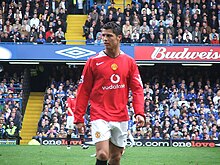
Ronaldo playing against Chelsea in April 2006.
Ronaldo made his team debut as a 60th-minute substitute in a 4–0 home victory over Bolton Wanderers. He scored his first goal for Manchester United with a free kick in a 3–0 win over Portsmouth on 1 November 2003. Ronaldo ended his first season in English football by scoring the opening goal in United's 3–0 FA Cup final victory over Millwall.[26]
He scored United's 1000th Premier League goal on 29 October 2005 in a 4–1 loss to Middlesbrough.[27] He scored ten goals in all competitions, and fans voted him to his first FIFPro Special Young Player of the Year award in 2005.
He was sent off in the Manchester derby at the City of Manchester Stadium on 14 January 2006 (a game which United lost 3–1) for kicking City's former United player Andrew Cole.[28]
Ronaldo won his second trophy in English football in the 2005–06 season, scoring the third goal in Manchester United's 4–0 Football League Cup final victory over Wigan Athletic.[29]
2006–2009
The 2006–2007 season proved to be the breakout year for Ronaldo, as he broke the 20 goal barrier for the first time and picked up his first league title with Manchester United.In November and December 2006, Ronaldo received consecutive Barclays Player of the Month honours, becoming only the third player in Premier League history to do so after Dennis Bergkamp in 1997 and Robbie Fowler in 1996.[30][31] He scored his 50th Manchester United goal against city rivals Manchester City on 5 May 2007 as United claimed their first Premier League title in four years, and he was voted into his second consecutive FIFPro Special Young Player of the Year award at the end of the year.
Despite rumours circulating in March 2007 that Real Madrid were willing to pay an unprecedented €80 million (£54 million) for Ronaldo,[32] he signed a five-year, £120,000-a-week (£31 million total) extension with United on 13 April, making him the highest-paid player in team history.[33][34]
Ronaldo amassed a host of personal awards for the season. He won the PFA Players' Player of the Year and PFA Young Player of the Year awards, joining Andy Gray (in 1977) as the only players to receive this honour.[35] In April, he completed the treble by winning the PFA Fans' Player of the Year. He also won the PFA Fans' Player of the Year and the FWA Footballer of the Year, becoming the first player to win all four main PFA and FWA awards. Ronaldo was also one of eight Manchester United players named in the 2006–07 PFA Premier League Team of the Year.
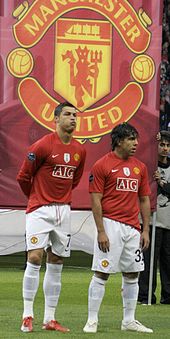
Ronaldo (left) and Carlos Tévez prior to a Champions League match.
He finished as the runner-up to Kaká for the 2007 Ballon d'Or,[39] and was third in the running for the FIFA World Player of the Year award, behind Kaká and Lionel Messi.[40]
Ronaldo scored his first hat trick for Manchester United in a 6–0 win against Newcastle United at Old Trafford on 12 January 2008, bringing Manchester United up to the top of the Premier League table.[41] He scored his twenty-third league goal of the season in a 2–0 win against Reading, equalling his entire total for the 2006–07 season.[42] During a 1–1 Champions League first knockout round draw against Lyon on 20 February, an unidentified Lyon supporter continuously aimed a green laser at Ronaldo and United teammate Nani, prompting an investigation by UEFA.[43] One month later, Lyon were fined CHF5,000 (£2,427) for the incident.[44]
On 19 March 2008, Ronaldo captained United for the first time in his career in a home win over Bolton, scoring both goals in the 2–0 victory.[45] The second of the goals was his 33rd of the campaign, which set a new club single-season scoring record by a midfielder and thus topped George Best's forty-year-old total of 32 goals in the 1967–68 season.[46] Ronaldo scored another brace in a 4–0 win over Aston Villa on 29 March, which at the time gave him 35 goals in 37 domestic and European matches as both a starter and substitute. Ronaldo's scoring streak was rewarded with his becoming the first winger to win the 2007–08 European Golden Shoe, finishing eight points ahead of Mallorca's Dani Güiza.[47]
"Ronaldo is better than George Best and Denis Law, who were two brilliant and great players in the history of United."
On 5 June 2008, Sky Sports reported that Ronaldo had expressed an interest in moving to Real Madrid if they offered him the same amount of money the team had allegedly promised him earlier in the year.[50] Manchester United filed a tampering complaint with FIFA on 9 June over Madrid's alleged pursuit of Ronaldo, but FIFA declined to take any action.[51][52] Speculation that a transfer would happen continued until 6 August, when Ronaldo confirmed that he would stay at United for at least another year.[53]
Ronaldo underwent ankle surgery at the Academic Medical Center in Amsterdam on 7 July.[54] He returned to action on 17 September in United's goalless UEFA Champions League group stage draw with Villarreal as a substitute for Park Ji-Sung,[55] and scored his first goal of the season in a 3–1 League Cup third round win over Middlesbrough on 24 September.
In a 5–0 win over Stoke City on 15 November 2008, Ronaldo scored his 100th and 101st goals in all competitions for Manchester United, both from free kicks.[56] The goals also meant that Ronaldo had now scored against each of the other 19 teams in the Premier League at the time.[57] On 2 December, Ronaldo became Manchester United's first Ballon d'Or recipient since George Best in 1968. He finished with 446 points, 165 ahead of runner-up Lionel Messi.[58] He was awarded the Silver Ball after finishing with two goals as United won the Club World Cup on 19 December.[59]
On 8 January 2009, Ronaldo was uninjured in a single-car accident in which he wrote off his Ferrari 599 GTB Fiorano in a tunnel along the A538 near Manchester Airport. A breathalyser test he gave to police officers at the scene was negative, and he attended training later that morning.[60] Four days later, he became the first Premier League player ever to be named the FIFA World Player of the Year, in addition to being the first Portuguese player to win the award since Luís Figo in 2001.[61]
Ronaldo scored his first Champions League goal of the season, and first since the final against Chelsea, in a 2–0 victory over Internazionale that sent United into the quarter-finals.[62] In the second leg against Porto, Ronaldo scored a 40-yard game-winning goal as United advanced to the semi-finals. For this goal Ronaldo holds the distinction of being the first player to win the FIFA Puskás Award, in 2009, an honour handed by FIFA to the best goal of the year.[63] He later called it the best goal he had ever scored.[64][65] Ronaldo participated in his second consecutive Champions League final, but made little impact in United's 2–0 loss to Barcelona. He finished with 53 appearances in all competitions, which was four higher than the previous year, but scored sixteen fewer goals (26) than his career-best total of 42 from the previous season.
On 11 June, Manchester United accepted an unconditional offer of £80 million from Real Madrid for Ronaldo after it was revealed that he again had expressed his desire to leave the club.[66] It was confirmed by a representative of the Glazer family that the sale was fully condoned by Ferguson.[67] When Ronaldo had eventually completed his transfer to Real, he expressed his gratitude towards Ferguson for helping him develop as a player, saying, "He's been my father in sport, one of the most important factors and most influential in my career."[68]
Real Madrid
2009–10 season
"I have nothing but praise for the boy. He is easily the best player in the world. He is better than Kaká and better than Messi.
He is streets ahead of them all. His contribution as a goal threat is
unbelievable. His stats are incredible. Strikes at goal, attempts on
goal, raids into the penalty box, headers. It is all there. Absolutely
astounding."

Ronaldo taking a free kick with Real Madrid against Borussia Dortmund.
An ankle injury suffered on 10 October, while Ronaldo was on international duty with Portugal against Hungary,[84] kept him out until 25 November, which in turn caused him to miss both of Madrid's Champions League group stage matches against Milan. Ronaldo made his first post-injury start in a 1–0 El Clásico defeat to Barcelona on 29 November. On 6 December, he was sent off for the first time in his Madrid career in Madrid's 4–2 victory against Almería, a match which also saw him miss a penalty. He was carded first for removing his shirt during a goal celebration, then for kicking out at an opponent three minutes later.[85] He was second in the 2009 FIFA World Player of the Year award and also second in the 2009 Ballon d'Or award. On 5 May 2010 Ronaldo scored his first Real Madrid hat-trick in an away game against Mallorca. Ronaldo and Gonzalo Higuaín scored 53 league goals during the course of the season and became Real's highest scoring league duo in their history.[86]
2010–11 season
With the departure of Raúl during the summer of 2010, Ronaldo was handed the No. 7 jersey for Real Madrid.[87] On 23 October 2010, Ronaldo scored four goals against Racing de Santander,[88] the most goals he has ever scored in a single match.[89] This completed a goalscoring run of six consecutive matches (three in La Liga, one in the Champions League, and two for Portugal) in which Ronaldo scored in each match, totalling 11 goals, which is the most Ronaldo has scored in a single month. Before Real Madrid's 5–0 defeat by Barcelona at the Camp Nou, Ronaldo scored his second La Liga hat-trick of the season in a 5–1 win over Athletic Bilbao.[90] His final match of the calendar year saw him score a hat-trick in a 8–0 trashing of Levante in the Copa del Rey.[91]
Ronaldo during a friendly game against Peñarol before the beginning of the season.
In April he made another massive comeback from injury, sustaining a three-game scoring streak (including 2 goals in Champions League quarter-finals against Tottenham Hotspur), thus arriving to the first of a historical series of four El Clásico encounters two goals short of breaking his personal record of 42 goals in all competitions in a single season, achieved at Manchester United in the 2007–08 season.
During the second league edition of El Clásico, Ronaldo scored from the penalty spot and took his tally to 41 goals, also taking his scoring streak to four games. On 20 April, Ronaldo scored the winning goal against Barcelona in the 103rd minute of the Copa del Rey final.[98] This goal would later be chosen as both Ronaldo's and Real Madrid's best goal in the season by several fan polls, including those of Marca[99] and Real Madrid's website.[100] 7 May saw Real travel to the Ramón Sánchez Pizjuán to take on Sevilla, where Ronaldo led the thrashing of a woeful Andalusian side, scoring four goals in a 6–2 victory. These four goals took him to 46 for the season which surpassed his previous record of 42 in a season playing for Manchester United.[101] Three days later he reached 49 goals for the season, by scoring another hat-trick in a 4–0 home win against Getafe. On 15 May, after scoring two free-kick goals in a 3–1 win over Villarreal, he equalled the La Liga record with most goals in a season with 38, a record previously held by Telmo Zarra and Hugo Sánchez.
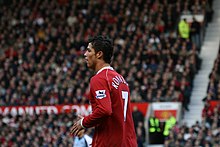
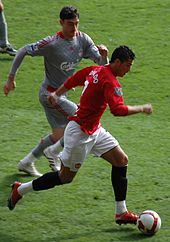
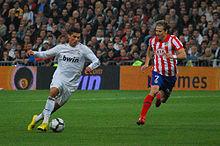

Tidak ada komentar:
Posting Komentar